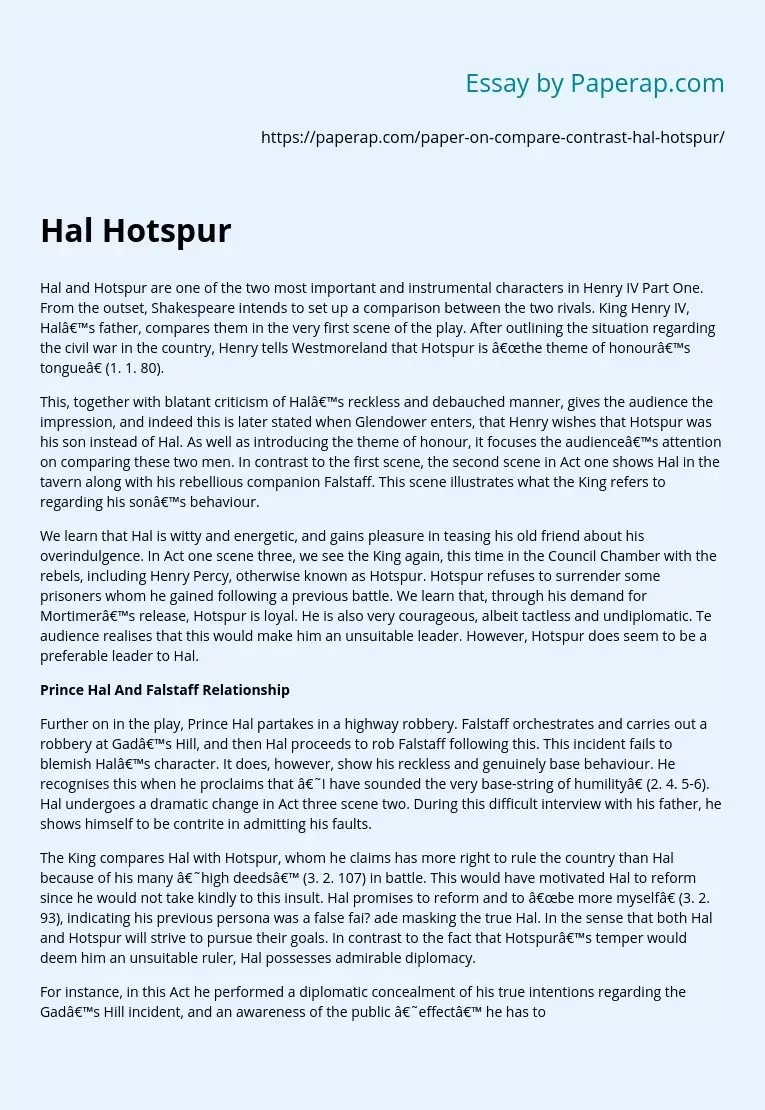Hal and Hotspur in Henry IV Part 1 Character Analysis
Hal and Hotspur are one of the two most important and instrumental characters in Henry IV Part One. From the outset, Shakespeare intends to set up a comparison between the two rivals. King Henry IV, Hal’s father, compares them in the very first scene of the play. After outlining the situation regarding the civil war in the country, Henry tells Westmoreland that Hotspur is “the theme of honour’s tongue” (1. 1. 80).
This, together with blatant criticism of Hal’s reckless and debauched manner, gives the audience the impression, and indeed this is later stated when Glendower enters, that Henry wishes that Hotspur was his son instead of Hal.
As well as introducing the theme of honour, it focuses the audience’s attention on comparing these two men. In contrast to the first scene, the second scene in Act one shows Hal in the tavern along with his rebellious companion Falstaff. This scene illustrates what the King refers to regarding his son’s behaviour.
We learn that Hal is witty and energetic, and gains pleasure in teasing his old friend about his overindulgence. In Act one scene three, we see the King again, this time in the Council Chamber with the rebels, including Henry Percy, otherwise known as Hotspur. Hotspur refuses to surrender some prisoners whom he gained following a previous battle. We learn that, through his demand for Mortimer’s release, Hotspur is loyal. He is also very courageous, albeit tactless and undiplomatic. Te audience realises that this would make him an unsuitable leader.
However, Hotspur does seem to be a preferable leader to Hal.
Prince Hal And Falstaff Relationship
Further on in the play, Prince Hal partakes in a highway robbery. Falstaff orchestrates and carries out a robbery at Gad’s Hill, and then Hal proceeds to rob Falstaff following this. This incident fails to blemish Hal’s character. It does, however, show his reckless and genuinely base behaviour. He recognises this when he proclaims that ‘I have sounded the very base-string of humility” (2. 4. 5-6). Hal undergoes a dramatic change in Act three scene two. During this difficult interview with his father, he shows himself to be contrite in admitting his faults.
The King compares Hal with Hotspur, whom he claims has more right to rule the country than Hal because of his many ‘high deeds’ (3. 2. 107) in battle. This would have motivated Hal to reform since he would not take kindly to this insult. Hal promises to reform and to “be more myself” (3. 2. 93), indicating his previous persona was a false fai? ade masking the true Hal. In the sense that both Hal and Hotspur will strive to pursue their goals. In contrast to the fact that Hotspur’s temper would deem him an unsuitable ruler, Hal possesses admirable diplomacy.
For instance, in this Act he performed a diplomatic concealment of his true intentions regarding the Gad’s Hill incident, and an awareness of the public ‘effect’ he has to achieve as a responsible Prince of Wales following the interview with his father. Further on in the play, we learn that Hotspur is very keen to fight. For instance, the first line in Act four scene three is by Hotspur that “We’ll fight him (Hal) tonight”. This trait is not desirable in a king. In contrast, in Act five scene one, Hal offers to fight Hotspur in single combat.
This brave and valiant statement was not said in earnest for a fight, but a noble gesture rather than risking the lives of thousands of men. This shows that Hal has matured. In contrast to Hal’s character at the start of the play, he is very much more sensible. The audience see Hal here as a skilled politician, like his father, offering a sensible solution to the grave problem of civil war that plagued the country. To conclude, at the start of the play, I would have deemed Hal to be a most unsuitable King, and Hotspur as one to whom the title would be most suited.
However, during the course of the play, Shakespeare constructs a complex character development for both Hal and Hotspur. At the end of the play, after Hal’s triumphant reformation, I would argue that he is by far a more appropriate leader. He possesses all the necessary qualities, diplomacy, courage and honour to name but a few. Hotspur is impulsive, albeit brave, undiplomatic and tactless. To have Hal fighting with him instead of in opposition to him only strengthens Henry’s position regarding his previously uncertain title to the throne.
Hal and Hotspur in Henry IV Part 1 Character Analysis. (2019, Dec 05). Retrieved from https://paperap.com/paper-on-compare-contrast-hal-hotspur/

